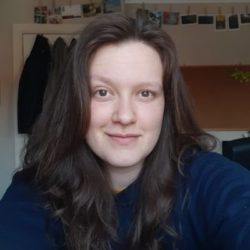LIFD Early Career Research Spotlight August: Francesca Morris

Our monthly spotlight on the work and lives of the researchers from the Leeds Institute for Fluid Dynamics
This month: Francesca Morris
Thesis title: Organised Convection and Large-Scale Circulation in the Tropics, from a Potential Vorticity Perspective
School/ Faculty: School of Earth and Environment
Supervisors: Dr Juliane Schwendike, Professor Doug Parker, and Dr Caroline Bain (external supervisor at the Met Office)
Tell us a bit about yourself:
My name is Fran, I’m a PhD student just about to go into my third year at Leeds, and I grew up near London. When I was going to university, I found it difficult to pick what I wanted to study because I found pretty much everything interesting, but I eventually decided that the most interesting subject was physics because it had the capacity to explain the most things. As soon as we started learning about fluid dynamics it quickly became my favourite area of physics because it has the power to describe so much, including so many relevant and important processes in the world around us, and yet there’s still so much to learn about it. Then, inspired by some of my tutors, when I was able to pick a project in my fourth and final year, I decided to specialise in atmospheric physics. My project focused on thunderstorms, looking at rapid-scan satellite imagery of US storm systems to examine cloud-top features, and enjoyed research so much that I stayed on over summer to do another project evaluating scaled linear satellite retrievals of trace gases before joining the Atmospheric and Cloud Dynamics group in the Institute of Climate and Atmospheric Science (ICAS) at Leeds in 2019 to start my PhD.
In my spare time I enjoy making music, drawing, painting, and writing – in fact, generally being creative in any way (and I will take any opportunity to draw illustrations in presentations). I’ve also been known to organise quidditch tournaments. Since being at Leeds I’ve also really enjoyed taking part in ICAS’s weekly informal meeting ‘Chatmosphere’, where we discuss the weather, forecasting the next week and looking at previous analysis, and also taking a look at weather news articles from the UK and around the world. As a result, I have become particularly interested in the extremely curious phenomenon that is the weather reporting of the Daily Express…
What is your research about?
My PhD is about studying the impact of large-scale thunderstorms on the wider atmospheric circulation. I’ve particularly focused on West Africa, where these thunderstorms can have devastating impacts and are huge in size – often larger than the whole of England! – and can last for several days. These storms are known as mesoscale convective systems, and they’re so big that they can influence the weather in the surrounding region – by changing the thermodynamic environment, inducing large-scale winds so they can sustain themselves and continue existing for several days, and by creating vortices which may go on to form future storms. So far in my PhD I’ve been using high-resolution output from a convection-permitting climate model to examine the dynamical properties of these systems and evaluate their impacts on the wider region. I’m currently also exploring whether models capture vortices from these storms eventually developing into tropical depressions which could eventually become hurricanes, and later I hope to examine the statistics of vortices in the region to help inform novel initialisation techniques for operational weather models.
What did you wish you knew before starting a PhD?
It’s okay to not know things! There is nobody who knows everything about everything, especially not when they’re just starting out in a relatively new area. Sometimes time and experience is necessary to pick up information that will help you have a better overview of the research you’re doing, and you can’t expect to understand it all immediately – and that’s okay.
What are your plans for the future?
I’d love to stay in research. Honestly, I feel lucky to even be doing a PhD where I can do such a wide range of things I enjoy – maths, coding, writing, presenting, teaching, designing posters and presentations, outreach, collaboration – all in the same job! Any opportunity to continue doing that would be amazing.
